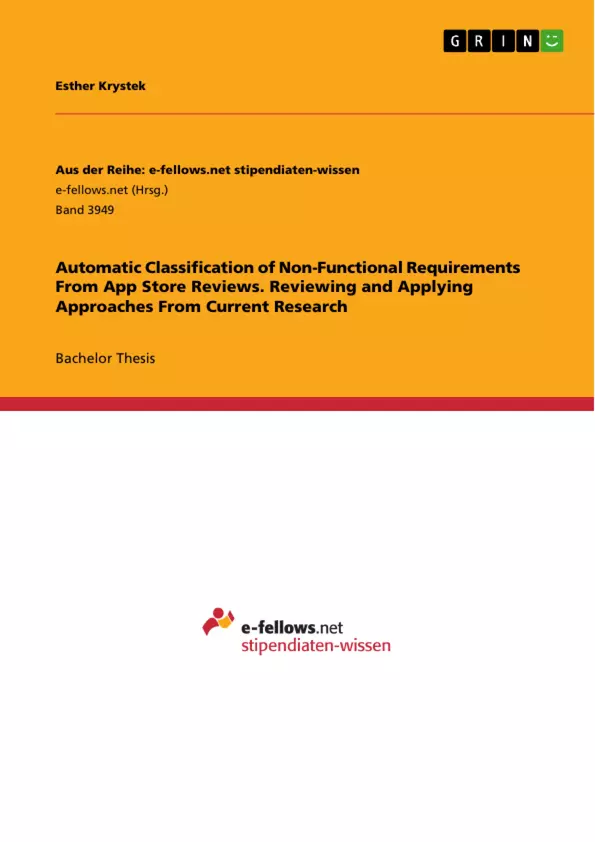
Automatic Classification of Non-Functional Requirements From App Store Reviews. Reviewing and Applying Approaches From Current Research
Bachelorarbeit, 2021
33 Seiten, Note: 1,3
Leseprobe
Inhaltsverzeichnis (Table of Contents)
- Introduction
- Objectives of the Thesis
- Structure of the Thesis
- Theoretical Background
- Introduction to Requirements Engineering
- Distinction Between Functional and Non-Functional Requirements
- Literature Review
- Methodology
- Different Taxonomies for Non-Functional Requirements
- App Store Reviews Containing Non-Functional Requirements
- Different Machine Learning Algorithms to Classify Non-Functional Requirements
- Applying the Support Vector Machine Algorithm to Classify an Existing Dataset
- Results
- Discussion
- Contributions to Theory
- Contributions to Practice
- Limitations and Future Work
- Conclusion
Zielsetzung und Themenschwerpunkte (Objectives and Key Themes)
This thesis explores the nature of non-functional requirements (NFRs), their characteristics in app store reviews, and existing research on automated solutions for classifying NFRs from such reviews. The goal is to investigate the performance of a machine learning (ML) algorithm trained on a manually labeled dataset of app store reviews. The thesis aims to contribute to both theoretical understanding and practical applications of NFR identification.
- The nature and characteristics of NFRs in app store reviews
- The state of research on automating NFR classification from app store reviews
- The performance of a specific ML algorithm for NFR classification
- Potential applications and limitations of automated NFR classification
- Future research directions in this field
Zusammenfassung der Kapitel (Chapter Summaries)
The first chapter introduces the concept of Requirements Engineering (RE) and its importance in software development. It highlights the distinction between functional requirements (FRs) and NFRs, emphasizing the significance of NFRs for user satisfaction, particularly in mobile applications. The chapter then outlines the thesis's objectives and structure.
The second chapter provides a theoretical background by discussing the core concepts of RE, including the different types of requirements, particularly focusing on NFRs and their classification. This chapter lays the groundwork for understanding the challenges of extracting and classifying NFRs from app store reviews.
Chapter 3 delves into a comprehensive review of relevant literature. It explores different taxonomies for NFRs and examines how these NFRs manifest within app store reviews. The chapter also examines previous research efforts to automate NFR classification using machine learning (ML) algorithms.
Chapter 4 focuses on the development and application of a specific ML algorithm, the Support Vector Machine, to a dataset of manually labeled app store reviews. The chapter details the methodology used for training and testing the algorithm.
Schlüsselwörter (Keywords)
The central themes of this thesis revolve around requirements engineering, non-functional requirements, app store reviews, machine learning, classification algorithms, and performance evaluation. The thesis investigates the potential for automating the extraction and classification of NFRs from user reviews, aiming to improve the development and user satisfaction of mobile applications.
Frequently Asked Questions
What are Non-Functional Requirements (NFRs)?
NFRs describe the quality attributes of a system, such as usability, performance, dependability, and supportability, rather than specific behaviors (functional requirements).
Why is it important to classify NFRs from App Store reviews?
Users often report issues or expectations regarding app quality in reviews. Automatically identifying these help developers prioritize improvements to meet user expectations.
Which machine learning algorithm performed best for NFR classification?
Research analyzed in the thesis indicates that the Support Vector Machine (SVM) algorithm consistently showed the best performance for this task.
What categories were used to classify the reviews?
Reviews were classified into four main categories: Usability, Dependability, Performance, and Supportability, or marked as having no NFR content.
What are the limitations of manual review inspection?
Manual inspection is tedious, time-consuming, and often infeasible due to the vast volume of data generated in app marketplaces.
Details
- Titel
- Automatic Classification of Non-Functional Requirements From App Store Reviews. Reviewing and Applying Approaches From Current Research
- Hochschule
- Universität Mannheim
- Note
- 1,3
- Autor
- Esther Krystek (Autor:in)
- Erscheinungsjahr
- 2021
- Seiten
- 33
- Katalognummer
- V1130435
- ISBN (eBook)
- 9783346489913
- ISBN (Buch)
- 9783346489920
- Sprache
- Englisch
- Schlagworte
- Requirements Engineering App Store Reviews Non-Functional Requirements Requirements Software Development Machine Learning RE NFRs ML
- Produktsicherheit
- GRIN Publishing GmbH
- Preis (Ebook)
- US$ 17,99
- Preis (Book)
- US$ 19,99
- Arbeit zitieren
- Esther Krystek (Autor:in), 2021, Automatic Classification of Non-Functional Requirements From App Store Reviews. Reviewing and Applying Approaches From Current Research, München, Page::Imprint:: GRINVerlagOHG, https://www.diplomarbeiten24.de/document/1130435
- Autor werden
- Ihre Optionen
- Vertriebskanäle
- Premium Services
- Autorenprofil
- Textarten und Formate
- Services für Verlage, Hochschulen, Unternehmen

- © GRIN Publishing GmbH.
- Alle Inhalte urheberrechtlich geschützt. Kopieren und verbreiten untersagt.
- info@grin.com
- AGB
- Open Publishing
Der GRIN Verlag hat sich seit 1998 auf die Veröffentlichung akademischer eBooks und Bücher spezialisiert. Der GRIN Verlag steht damit als erstes Unternehmen für User Generated Quality Content. Die Verlagsseiten GRIN.com, Hausarbeiten.de und Diplomarbeiten24 bieten für Hochschullehrer, Absolventen und Studenten die ideale Plattform, wissenschaftliche Texte wie Hausarbeiten, Referate, Bachelorarbeiten, Masterarbeiten, Diplomarbeiten, Dissertationen und wissenschaftliche Aufsätze einem breiten Publikum zu präsentieren.
Kostenfreie Veröffentlichung: Hausarbeit, Bachelorarbeit, Diplomarbeit, Dissertation, Masterarbeit, Interpretation oder Referat jetzt veröffentlichen!
- GRIN Verlag GmbH
-
- Nymphenburger Str. 86
- 80636
- Munich, Deutschland
- +49 89-550559-0
- +49 89-550559-10
- info@grin.com
-









